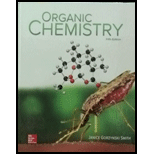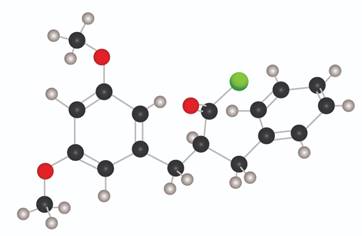
Organic Chemistry
5th Edition
ISBN: 9780078021558
Author: Janice Gorzynski Smith Dr.
Publisher: McGraw-Hill Education
expand_more
expand_more
format_list_bulleted
Concept explainers
Textbook Question
Chapter 18, Problem 18.35P
What is the major product formed by an intramolecular Friedel–Crafts acylation of the following compound?

Expert Solution & Answer
Want to see the full answer?
Check out a sample textbook solution
Students have asked these similar questions
Which of the following compounds will react with methylamine
to form the imine shown below?
N.
Which of the following compounds reacts most rapidly in a nitration reaction?
The Stork reaction is a condensation reaction between an enamine donor and an α,β-unsaturated carbonyl acceptor. The overall reaction consists of a three-step sequence of
formation of an enamine from a ketone,
Michael addition to an α,β-unsaturated carbonyl compound, and
hydrolysis of the enamine in dilute acid to regenerate the ketone.
Consider the Stork reaction between cyclohexanone and propenal
Draw the structure of the product of the enamine formed between cyclohexanone and dimethylamine.
- Michael addition to an α,β-unsaturated carbonyl compound, and
- hydrolysis of the enamine in dilute acid to regenerate the ketone.
Chapter 18 Solutions
Organic Chemistry
Ch. 18 - Prob. 18.1PCh. 18 - Prob. 18.2PCh. 18 - Prob. 18.3PCh. 18 - Prob. 18.4PCh. 18 - Prob. 18.5PCh. 18 - Prob. 18.6PCh. 18 - Prob. 18.7PCh. 18 - Prob. 18.8PCh. 18 - Problem 18.9 Draw the product of each reaction
a....Ch. 18 - Prob. 18.10P
Ch. 18 - Prob. 18.11PCh. 18 - Prob. 18.12PCh. 18 - Prob. 18.13PCh. 18 - Problem 18.14 Draw all resonance structures for...Ch. 18 - Problem 18.15 Classify each substituent as...Ch. 18 - Prob. 18.16PCh. 18 - Problem 18.17 Label each compound as more or less...Ch. 18 - Problem 18.18 Rank the following compounds in...Ch. 18 - Prob. 18.19PCh. 18 - Problem 18.20 Draw the products of each...Ch. 18 - Prob. 18.21PCh. 18 - Problem 18.22 Draw the products formed when each...Ch. 18 - Problem 18.23 Devise a synthesis of each compound...Ch. 18 - Problem 18.24 Draw the products of each...Ch. 18 - Problem 18.25 Draw a stepwise mechanism for the...Ch. 18 - Problem 18.26 Draw the products of each...Ch. 18 - Prob. 18.27PCh. 18 - Prob. 18.28PCh. 18 - Problem 18.29 How could you use ethylbenzene to...Ch. 18 - Prob. 18.30PCh. 18 - Problem 18.31 What steps are needed to convert...Ch. 18 - Problem 18.32 Synthesize each compound from...Ch. 18 - Problem 18.33 Synthesize each compound from...Ch. 18 - Prob. 18.34PCh. 18 - 18.35 What is the major product formed by an...Ch. 18 - 18.36 Draw the products formed when phenol is...Ch. 18 - Problem 18.37 Draw the products formed when each...Ch. 18 - 18.38 Draw the products of each reaction.
a. d....Ch. 18 - 18.39 What products are formed when benzene is...Ch. 18 - 18.40 Draw the products of each reaction.
c.
d....Ch. 18 - 18.41 You have learned two ways to make an alkyl...Ch. 18 - 18.42 Draw the structure of A, an intermediate in...Ch. 18 - Prob. 18.43PCh. 18 - Prob. 18.44PCh. 18 - 18.45 Explain why each of the following reactions...Ch. 18 - Prob. 18.46PCh. 18 - 18.47 For each of the following substituted...Ch. 18 - 18.48 Consider the tetracyclic aromatic compound...Ch. 18 - 18.49 For each N-substituted benzene, predict...Ch. 18 - Prob. 18.50PCh. 18 - 18.51 Using resonance structures, explain why a...Ch. 18 - Prob. 18.52PCh. 18 - 18.53 Rank the aryl halides in each group in order...Ch. 18 - 18.54 Draw a stepwise mechanism for the following...Ch. 18 - Prob. 18.55PCh. 18 - 18.56 Draw a stepwise, detailed mechanism for the...Ch. 18 - Prob. 18.57PCh. 18 - 18.58 Draw a stepwise mechanism for the following...Ch. 18 - Prob. 18.59PCh. 18 - Prob. 18.60PCh. 18 - Prob. 18.61PCh. 18 - Prob. 18.62PCh. 18 - 18.63 Synthesize each compound from benzene and...Ch. 18 - Problem 18.64 Synthesize each compound from...Ch. 18 - Prob. 18.65PCh. 18 - Prob. 18.66PCh. 18 - Prob. 18.67PCh. 18 - Prob. 18.68PCh. 18 - Problem 18.69 Identify the structures of isomers A...Ch. 18 - Prob. 18.70PCh. 18 - Problem 18.71 Compound X (molecular formula ) was...Ch. 18 - 18.72 Reaction of p-cresol with two equivalents of...Ch. 18 - Prob. 18.73PCh. 18 - The NMR spectrum of phenol () shows three...Ch. 18 - Explain the reactivity and orientation effects...Ch. 18 - Prob. 18.76PCh. 18 - Prob. 18.77PCh. 18 - Prob. 18.78PCh. 18 - Prob. 18.79P
Knowledge Booster
Learn more about
Need a deep-dive on the concept behind this application? Look no further. Learn more about this topic, chemistry and related others by exploring similar questions and additional content below.Similar questions
- Rank the following compounds in order of increasing reactivity in nucleophilic acyl substitution.arrow_forwardExplain how the electrophilic substitution sequences for synthesizing the following compounds from phenol.arrow_forwardRank the following carbonyl compounds in order of increasing reactivity in nucleophilic substitution reactions Please explainarrow_forward
- arrange the following compounds in order of decreasing reactivity towards hydrolysisarrow_forwardRank the following esters in order of decreasing reactivity in the first slow step of a nucleophilic acyl substitution reaction (formation of the tetrahedral intermediate):Rank the same esters in order of decreasing reactivity in the second slow step of a nucleophilic acyl substitution reaction (collapse of the tetrahedral intermediate).arrow_forwardWhat organolithium reagent and carbonyl compound can be used to prepare each of the following compounds? You may use aldehydes, ketones, or esters as carbonyl starting materials.arrow_forward
- Draw the structures of the initially formed enol tautomers in the reactions of propyne and dicyclohexylethyne with dicyclohexylborane followed by NaOHNaOH and H2O2H2O2arrow_forwardThe Stork reaction is a condensation reaction between an enamine donor and an α,β-unsaturated carbonyl acceptor. The overall reaction consists of a three-step sequence of formation of an enamine from a ketone, Michael addition to an α,β-unsaturated carbonyl compound, and hydrolysis of the enamine in dilute acid to regenerate the ketone. Consider the Stork reaction between acetophenone and 3-buten-2-one. Draw the structure of the product of the enamine formed between acetophenone and pyrrolidine. Draw the structure of the Michael addition product. Draw the structure of the final product.arrow_forwardShow how the benzyl methyl ether can be synthesized from benzene:arrow_forward
arrow_back_ios
SEE MORE QUESTIONS
arrow_forward_ios
Recommended textbooks for you
 Organic ChemistryChemistryISBN:9781305580350Author:William H. Brown, Brent L. Iverson, Eric Anslyn, Christopher S. FootePublisher:Cengage Learning
Organic ChemistryChemistryISBN:9781305580350Author:William H. Brown, Brent L. Iverson, Eric Anslyn, Christopher S. FootePublisher:Cengage Learning

Organic Chemistry
Chemistry
ISBN:9781305580350
Author:William H. Brown, Brent L. Iverson, Eric Anslyn, Christopher S. Foote
Publisher:Cengage Learning

Characteristic Reactions of Benzene and Phenols; Author: Linda Hanson;https://www.youtube.com/watch?v=tjEqEjDd87E;License: Standard YouTube License, CC-BY
An Overview of Aldehydes and Ketones: Crash Course Organic Chemistry #27; Author: Crash Course;https://www.youtube.com/watch?v=-fBPX-4kFlw;License: Standard Youtube License